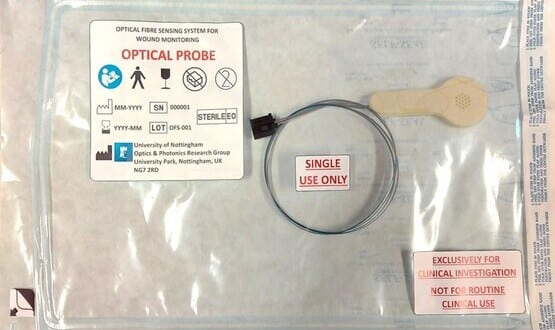University Hospitals of Derby and Burton to trial smart wound dressings
- 15 May 2023

University Hospitals of Derby and Burton NHS Foundation Trust are to trial a new smart wound sensor that could help reduce the risk of amputation in people with diabetes.
Researchers at the University of Nottingham received a £902,524 grant from the Medical Research Council to develop a smart wound dressing embedded with optical fibre sensors to assess whether affected tissue is healing or not. The technology is now undergoing a trial at Derby and Burton with 10 patients having the dressings applied and monitored.
Professor Fran Game, consultant diabetologist and clinical director of research and development at the Derby Clinical Trials Support Unit at University Hospitals of Derby and Burton, said: “Technologies to monitor wounds remotely and assess when things are going well or not so well, have the potential to have a significant impact on patients’ lives and health service costs. If we knew that a wound was healing well without having to use healthcare professionals’ time just to visually inspect it, it would make a huge difference to the NHS.
“Equally, knowing very quickly that wound healing had stalled, or an infection had developed, would mean that we could commence appropriate treatments much more promptly which would improve outcomes.”
Currently, the only way for healthcare professionals to assess healing rates is with a visual examination through regular wound redressing. However, this can encourage infection and affect the progress of wound healing. In addition, it also uses up valuable NHS resources.
Professor Steve Morgan, co-director of the Centre for Healthcare Technologies, explained: “Our smart wound dressing addresses this through the incorporation of optical fibre sensors, which can remotely monitor multiple factors associated with wound management, such as temperature, humidity and gases associated with healing and infection.
“This has the potential to indicate the optimum time for changing the dressing and could alert clinicians about whether an intervention is required for an infected or slow-healing wound. If successful, the impact would be a reduction in the number of healthcare appointments along with improved patient care.”
The research team includes clinicians at University Hospitals of Derby and Burton NHS Foundation Trust, Nottingham-based smart textiles company Footfalls and Heartbeats, and the Clinical Engineering Department at Nottingham University Hospitals NHS Trust.
They hope that with a better understanding of ulcer healing and monitoring they can help to cut the risk of amputations for patients, by supporting earlier intervention should a wound become infected.




